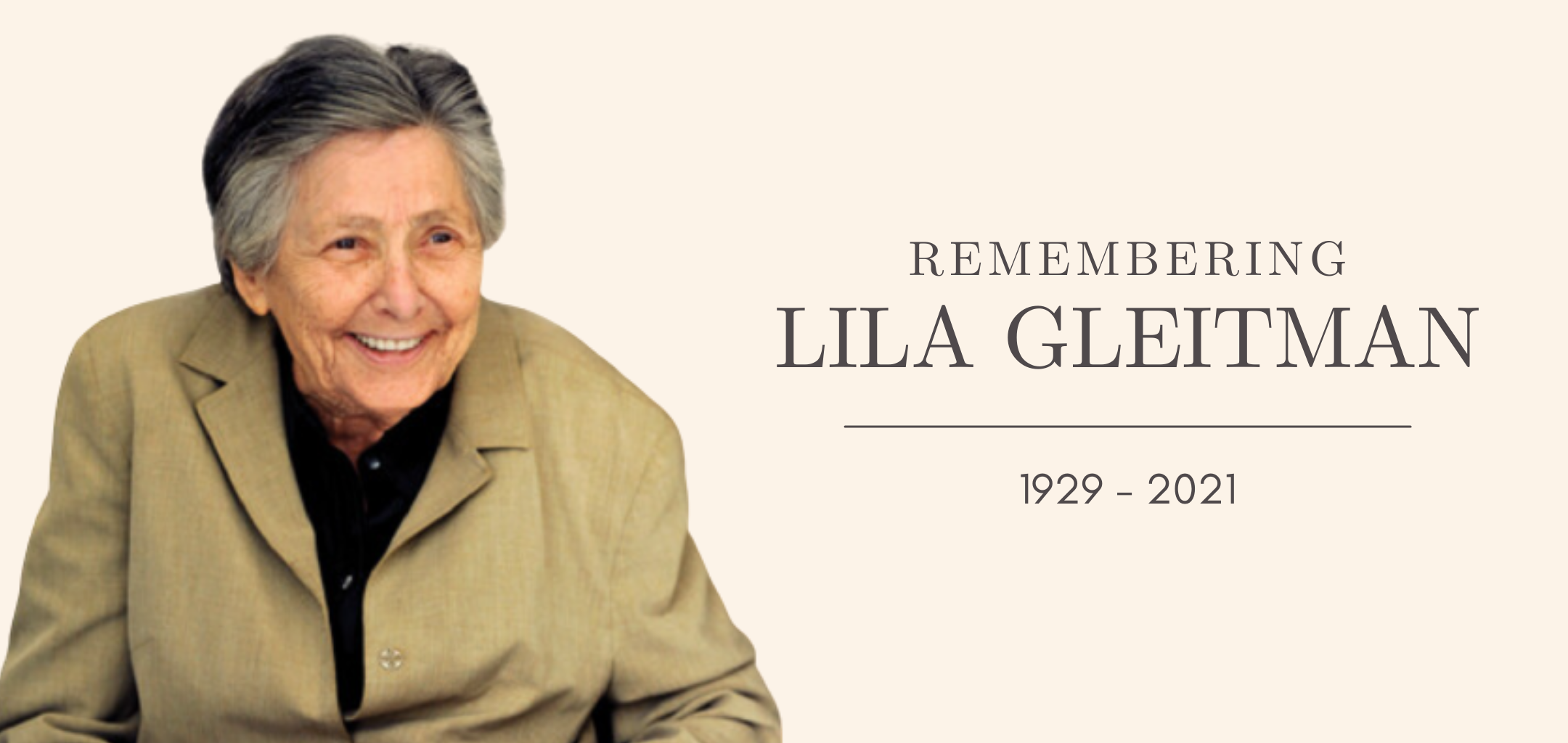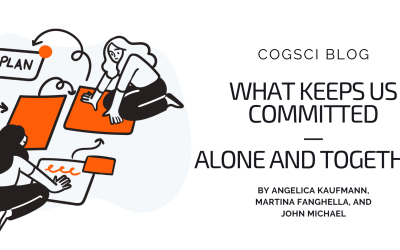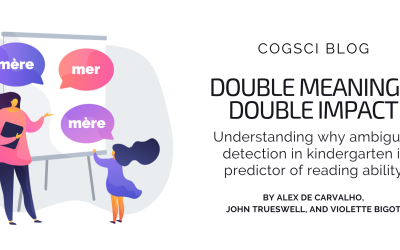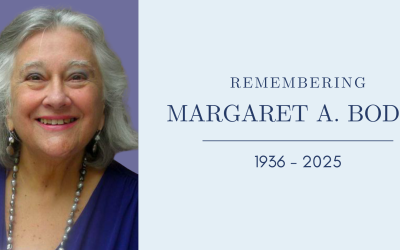Lila R. Gleitman, a winner of the David E. Rumelhart Prize for her contributions to the theoretical foundations of human cognition, passed away on August 8, 2021. Gleitman was Professor Emerita of Psychology and Linguistics at the University of Pennsylvania, and a pioneering figure in the field of modern cognitive science.
In a career that spanned six decades, Gleitman made numerous foundational discoveries in the study of language and cognition. She is particularly known for her research on how children acquire language, how language and thought are related, and the role of syntax in shaping the direction of word learning.
Gleitman was widely recognized for her influential research: She was a member of the National Academy of Sciences and an elected fellow of the American Psychological Association, the Association for Psychological Science, the Society of Experimental Psychologists, the American Association for the Advancement of Science, and the American Academy of Arts and Sciences. She served as President of the Society for Language Development, the Society for Philosophy and Psychology, and the Linguistic Society of America.
Gleitman was a legendary mentor who trained a long and distinguished list of psycholinguists, many of whom went on to become central figures in the field. In 1991, Gleitman co-founded the famous Institute for Research in Cognitive Science at Penn, which she co-directed until 2001. Under her leadership, the Institute became a model for promoting interactions between psychology, linguistics, computer science, philosophy, neuroscience and other branches of inquiry that contribute to the computational study of the mind.
Her colleagues and former mentees recently shared some of their memories and appreciations with us. Here’s what they wrote:
Elissa Newport
Georgetown University
When I met Lila, there were hardly any women on the faculty in our field. Young women of my age at that time did not have agonizing conversations about this. Half our graduate school class was women. I have no idea what we thought we would do when we got our PhDs.
But I LOVED my first year in graduate school – I was learning to think about really interesting questions in new ways, and I was reading and working all the time. And I definitely was worried about how I would have a marriage and a family and also be as deeply involved with my work as I was becoming.
I met Lila when I went to Swarthmore to take a linguistics class from her. In week 4 of the course I called her to say that I could not do my presentation because my husband of the time and I had just separated. She said, why don’t you come live with us? I was speechless – she hardly knew me – but uncertain about where I would live, I called her back and took her up on her offer.
I ended up spending about a month living with the amazing Gleitmans. Talking day and night with them about what I was experiencing personally and also about what I wanted to do research on. I don’t remember doing anything for those weeks but being revived by talking with them.
Eventually I moved out of their house and continued on in graduate school. But over the last 50 years I spent millions of hours in their kitchen, and at conferences and Japanese restaurants and on the phone with Lila, everywhere we could spend time together.
What I learned from Lila is how to live my life as an academic woman. In some ways it was very simple: the love of the field, the love of the questions, talking about them and thinking of new experiments and new ideas, was a 24/7 thing for Lila. And love of her work was fully mixed with love of her family (who were sometimes the little people she studied) and the love of her students (our work and our successes and our troubles) and watching basketball on TV and playing bridge with Henry and Ellen. It wasn’t choices for Lila, she loved all of us. She loved everything she did.
My graduate students these days talk a lot about work/life balance. Lila and I NEVER talked about work/life balance. There was a time in grad school when I was having trouble figuring out what I wanted to work on and was thinking of dropping out. She said ‘But what will you do instead, be a cockroach?’ At the Gleitmans, work was life. But it was also fun and enormously captivating and part of our deepest relationships with each other. It is the way I think about my own life now too, working with my husband Ted and having children who grew up watching us love what we do.
Lila was brilliant and hysterically funny and an amazing scientist, a wonderful mentor and dearest friend. But what I want to say here is that she really knew how to live. The way she lived provided an irreplaceable model for me of how to build a life.
Susan Goldin-Meadow
University of Chicago
I met Lila in 1971. We wrote our first paper together in 1978, and our last in 2019. Lila taught me many things over the 50 years we knew each other––the importance of a good title (I reached my peak when I made up a great title and then wrote a paper to go with it), how to eat well without cooking, that the best conversations happen around the (Gleitman) kitchen table.
But my relationship with Lila deepened when I lost my husband, Bill, two years ago. Lila and I talked every week after his death, and she helped me cope with an unbearable loss. We talked about science, symmetricals of course, the past, the present, and how to go forward. I’m not sure why it was so comforting to talk to Lila. Maybe it’s because she was so much like Bill––very smart, very witty (but never at another’s expense), a lover of all sports, a first-class punster, a great gesturer (this will surprise many of you––no one thinks of Lila as a gesturer but she was as eloquent with her hands as she was with her words, as was my husband). And they both were giving and generous, didn’t berate themselves or anyone else, had strong opinions, and never shied away from controversy. They could light up a room with their smiles. People say you marry your mother or, in some cases, your father. It turns out, I married my advisor––who knew?
Lila helped me learn to live without Bill––I only hope I can apply what I learned to living without Lila. In my lighter moments, I see them both up there––joking, punning, enjoying each other, and cheering each of us on, as they always did––and always will.
Barbara Landau
Johns Hopkins University
Lila was my teacher, mentor, collaborator, and friend. We wrote together, shared grants (the first in 1978, the last in 2021, collaborative with John Trueswell), and talked often about science. Our first project together examined the role of visual experience in language learning, addressing classic questions about the origins of knowledge. I learned so much during those years: how to think about language and thought, that being broadly educated means being deeply educated, that your science should not be published until it was truly ready, and that your scientific papers should be like a symphony—elegant and beautifully structured. The intense sense of discovery and learning during my early, most formative years, is still palpable to me. And her influence as an intellectual and a scientist has carried me forward since then.
Lila’s work as a scientist was deeply entwined with the lives of her students and colleagues. In those days, there were no formal ‘work-life’ balance policies, no formal mentoring systems. Lila taught by example. So I not only learned to think, but also how to grow New Guinea Impatiens (large pots, lots of water), cook pork roast (use beer), and find the best cheeses. Importantly, I learned from her that it was not only possible, but also good (and right) to take a leave after having your first baby, and then return to your new life as scientist and mother.
Lila radiated warmth, humor, and joy. We laughed a lot. Once, I tried to buy copies of our book, Language and Experience, from Amazon (Harvard no longer printed it). The first option was a used copy selling for $1.37, the second a new copy, for $11.82. (Both were sub-par offers, Lila and I agreed.) But the best was an offer of the second-hand book, for $1800! The owner had written: “Excellent condition. Only read once.” We laughed at each entry, but for the last, she said “I refuse to believe that anyone would read our book only once!”
Now, I keep a picture of Lila on my computer screen so I can ask her questions, e.g.: “So what exactly do we mean by ‘concept’?” (She sends me back to re-read Fodor.) “Should I try the strongest version of this claim, or back down a bit?” (Answer: The strongest version. You must always have the courage of your convictions.) And: “Do you cut down daffodils after they bloom or just leave them?” (Answer: “Leave them. They eat themselves”.)
John Trueswell
University of Pennsylvania
I joined the faculty at Penn in 1993 because Penn had Lila Gleitman. At the time, she was co-directing, with Aravind Joshi, the amazing Institute for Research in Cognitive Science (IRCS), where she and Aravind had assembled a team of brilliant researchers all interested in computation, cognition, perception and language. They were shaping the field of Cognitive Science and it was an exciting place to be.
Lila made Penn a home for me. As Lila did for everyone she knew, she welcomed me with open arms, inviting me to all-things-Gleitman, which for the most part involved her being a walking-talking-living-breathing seminar! When I think of Lila Gleitman, I think of small gatherings, at a restaurant, or at her home, with a few students, as she held court. Cast under her spell, you could stay for hours and hours. She reminded you that the mind was a wonderful mystery, and we were only glimpsing, as she would say, “through our primitive powers of observation,” at something utterly amazing. She took you for a joy ride through her own mind, its complexity, and its beauty. And at the same time, she made you realize that your own ideas had merit. In this way, she truly was the master of the seminar.
Last fall, before she passed away, I held a graduate seminar, in honor of Lila. It was called “Students first, arguments afterward.” And, I am so thankful and honored to have held this seminar, just in time. In it, students gathered to read and debate the most significant works of Lila, recently published in her 896-page volume entitled “Sentence First, Arguments Afterward.” The seminar covered the topics that Lila found most fascinating, including language evolution and universality, language acquisition in children with different perceptual abilities, and the relation between language and thought. Because of the pandemic, we held it over Zoom. Lila was in attendance and many of her former students, now distinguished faculty themselves, joined remotely from around the world as we discussed work they had published together over the past 50 years.
I want you to know that as she was turning 91 that year, and nearly completely blind, Lila attended every single session from her apartment. Lila was in her element – charming, sharp as a tack, and devastatingly funny. Lila got to cast her spell, one more time.
It was an honor to be Lila’s friend and colleague. I’ll never forget her and how she touched so many with her wit, charm and brilliance.
Anna Papafragou
University of Pennsylvania
I first met Lila in 1999 when I came to Penn to be her postdoc at the famous Institute for Research in Cognitive Science. Over the next 20 years, we became close collaborators, friends, and, more recently, colleagues at Penn.
Lila brought three things into my life. As a scientist, she introduced me to a sense of joyful discovery, big ideas and a timeless taste in studying the human mind. Her intellectual perspective was both elegant and fierce. Working with her on questions of language and thought was extraordinary, and truly shaped my approach to cognitive science and what it means to be interdisciplinary.
Lila also brought love, friendship and generosity. She supported me, mentored me, and when I got my first job, took me out to dinner at Le Bec Fin, then the most exclusive French restaurant in Philadelphia (as I know she did with many others in her group). Over the years, there were many more dinners and conversations with Lila, both at home and around the world. Some of my favorite memories of her are from a trip to Greece we took in 2005. We went to Athens and Santorini, visited ancient monuments, and had wine and cheese pies with honey overlooking the Caldera. Lila even tried to strike up a conversation with our taxi driver in Homeric Greek, only to be met with a puzzled look. She was a fantastic person to travel with – funny, erudite, and always curious about new places and people. Everywhere she went, she connected with people; her smile was infectious.
Finally, Lila brought beauty into my life – through her humor, witty writing, great conversation, and love of art. In our last collaboration, she and I together with John Trueswell co-edited a Handbook on the Mental Lexicon (that, sadly, she won’t get to see in print). Lila worked tirelessly on the book through its many stages, even though by the end she was 91 years old and almost completely blind. When the time came to choose a cover, we had the option to go with a fine but somewhat unremarkable abstract painting. Lila, however, suggested a piece by William Blake – ‘Adam naming the beasts’ – an absolutely beautiful painting that evoked the main theme of the book – words and how humans learn and use them – in a truly meaningful and memorable way. As always, she was right. I’ll never forget her.



